Chapter 56 – Cathy Murphy (D4SOP1)
Domain 4 Standard of Proficiency 1
Be able to engage in and take responsibility for professional development.
|
KEY TERMS CPD Professional reflective learning/critique Supervision Responsibility Engagement |
Social care is … an ever-evolving rollercoaster of new skills and professionalism. You are often going to hear the words upskilling, training, retraining and refresher course. These words will become your best friends in upskilling. Where and when you find employment, you will generally be provided with a lot of these training sessions, which is good; but just remember that these are regulatory training sessions – ticking a box – another great phrase you will soon get used to. |
Welcome! Student, this is where your training begins and never ends. Your social care education only starts with your formal academic training; it continues throughout your career as a social care worker, in the form of continuing professional development (CPD).
Try not to think of professional training as ‘just ticking the boxes’. Whether you are working with the Traveller community, adult or child disability services, alcohol and drug misuse or homeless services, you will be forever learning about yourself and your profession. Embrace it, learn from it and use it. In your line of work, you are going to meet a lot of people with a variety of different needs. Essential to your professional development is the question of how you can further develop personal and professional skills in order to assist a person in his or her life.
Throughout my career I have involved myself in CPD, including:
- Mandatory training: SAMS (safe administration of medication), epilepsy training, safeguarding – this is very important
- Studio 111 – training that involves behavioural support for people with challenging behaviour
- Autism training
- Probation reviews
- Supervision
- Self-research – when I hear something I have never heard of before I tend to ask about it or research it
- At the moment I am attending the University of Limerick and studying a management course
- I have also worked on the national New Directions policy, which will eventually encompass all areas of day service (New Directions is a vital part of your training; you will find a lot about it on the HSE/New Directions website).
All of this can be achieved if you believe in yourself. When asked if you would like to take part in some kind of training or to be a part of a team working on a new project, go for it. This is how you learn. We have all been in a situation where we feel we do not know enough about a certain subject, but the only way to learn is to immerse yourself in it. Remember that other people in that room all started the same way – you learn on the job. Also, as a side note, interviews are great for CPD, but do not be disappointed if you do not get the job. Ring your interviewer and ask for feedback. If in the future there is an opportunity for advancement in your workplace or another area of the job you would like to try, GO FOR IT! Not getting the job does not mean you are not good enough; it just means you need more experience.
Continuing Professional Development (CPD)
CPD is a combination of methods and techniques that will enable you to manage your professional growth. It looks at the person in his/her totality – remember, in social care you are working with people and your personality and experiences are going to contribute to your learning and understanding. CPD happens in many different ways in different services. My CPD experience has been through probation reviews, supervision meetings, and also those times when you think ‘I should have done that differently’ or ‘I did not handle that very well’. I once worked with a service user who was quite obsessed with using the computers. He would come in first thing in the morning and stay there all day. Which of course was not healthy. So I decided that he should not have the computer any more. Without any consultation with the service user, I explained to him that there would be no more computer time. Of course, this did not go down well. The computer did not survive that day as the service user tipped it on the floor and broke it. In reflection, I understood that I had no right to tell anyone when they should and should not do what they want. It was all about the language I used. Instead of saying ‘no more computers’, I could have had a conversation and asked him what he would like to do instead of using the computer, or asked him to sit with me and make a visual timetable that included the computer but other activities as well. It turned out the service user was bored and found it difficult to engage in other activities.
This reflection on your experiences and how you learn from them is part of CPD. As you sit in class, in your bedroom or kitchen, or wherever you might be reading this, it is very difficult to understand how this works in practice, to be able to visualise what actually happens when physically working in the area of social care.
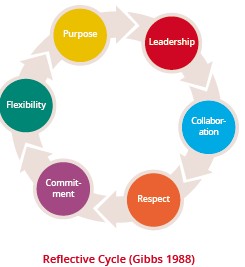
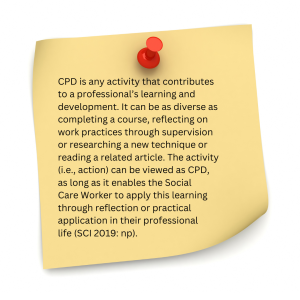
If a social care worker is not engaged in CPD, this can be detrimental to the service user. One resource to support you in understanding how learning is continual is Gibbs’ reflective cycle, which can provide you with the building blocks for reflecting on your professional practice to date and areas you can develop. Social care is so diverse and changeable: very often policies and procedures are updated and developed, and these have to be read and understood. If there is a policy on fire safety, for example, it is your responsibility to read and understand it. These policies are there to help you and the service users. This is CPD. Many times, a new service user will attend your service and you will need to get to know this person, their way of communicating, their diagnoses (if it is something you haven’t heard of, research it) their life experiences, their family life, their school life. You will also have to think of the ways you communicate so that you are understood; you will have to think outside the box and adapt. This is why we as professional social care workers are constantly learning and updating our work practices.
Professional Reflective Learning Using Gibbs’ Reflective Cycle
Graham Gibbs developed his reflective cycle in 1988 (Gibbs 1988). It was intended to give structure to learning from experience. It offers a framework for examining experiences, and given its cyclic nature it lends itself particularly well to repeated experiences, allowing you to learn and plan from things that either went well or didn’t go well. Essentially, Gibbs suggests that there are six sections in the reflective cycle: description, feelings, evaluation, analysis, conclusion and action plan. The reflective questions in the following diagram were created by John Murphy of Beam Services, Carlow, to support staff in a day service for adults with an intellectual disability, to reflect on their professional reflective learning.
Pick one of the following case studies and use Gibbs’ reflective cycle as a guide for professional reflective learning.
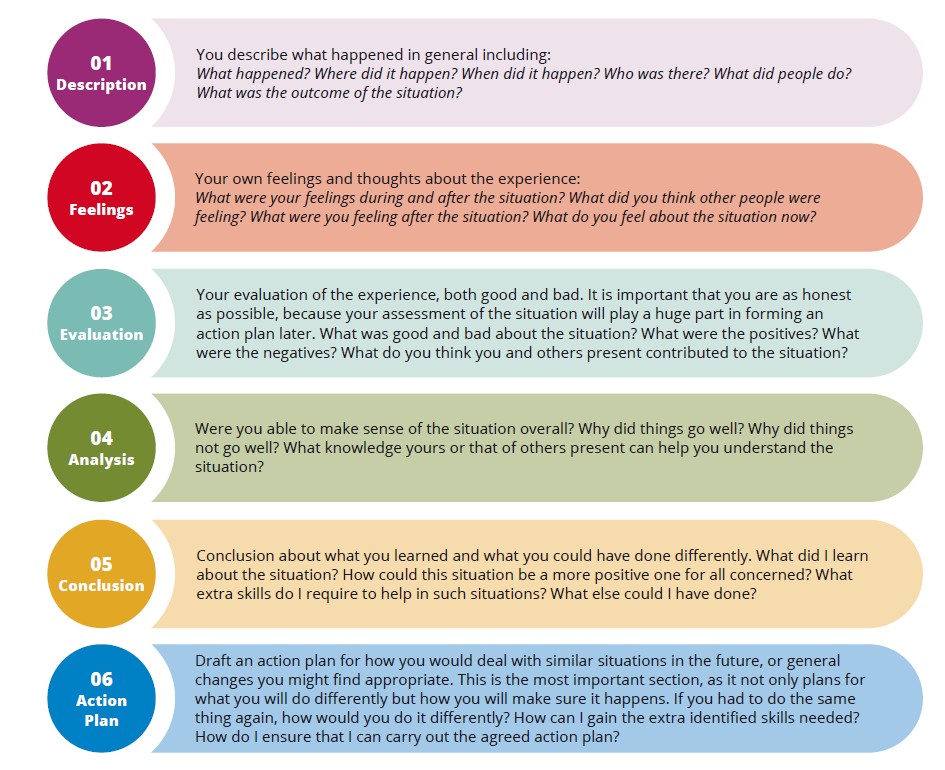
Case Study 1
John has been working in a new service for three months. He has been a social care worker for ten years but this is only his second place of employment. John has never had a probation review before. He feels a little nervous about it. John’s line manager, Tony, is conducting the probation review and he has asked John to write down how he feels he is doing in the job. John feels he is doing fine. Tony explains to John that there are few areas he would like John to improve; for example, his paperwork needs to be more up to date. Tony also states that he feels John works very well with the service users. At the end of the probation review Tony writes action plans for John on areas that he feels he may need to improve and dates by which these are to be achieved. Your first probation review may seem a little stressful, but it is not a moment where someone tells you how bad you are at things, it is for you to understand the professional critiquing and how to reflect on the information you receive. CPD means setting yourself professional objectives and goals and measuring how you reach them.
Case Study 2
Mary is an 18-year-old who has just finished school and has started in her first day services. Mary is verbal, autistic and has sensory processing issues. Mary has been attending St Andrew’s day centre but has been relocated to your centre. She arrives with a small file. You introduce her to everyone and they ask her lots of questions. Mary starts to become agitated, then Tom, another service user, turns on the radio quite loudly and walks over to Mary and asks her to dance. Mary responds by physically lashing out at Tom, hitting him on the arm, then she covers her ears and begins to shout. All the other services users become very upset and feel unsafe. Another staff member removes all the other services users to a different area where it is quiet and turns off the radio. Once Mary begins to calm, staff members bring her to the multi-sensory room to aid her in self-regulating her anxiety.
TASK 1
Using Gibbs’ reflective cycle, write about an event or situation, explain how you felt at the time, analyse it, evaluate it and reach a conclusion about the event. Do this in your own time.
Now set out an action plan using the template below:
|
Objectives |
Activities |
Indicators of Success |
Target Dates |
|
|
|
|
|
Supervision
Supervision in its basic form is where management or leaders support your professional development so that you provide the best standards of care. Supervision should take place at regular intervals. In a supervision meeting, your last supervision meeting will be examined and the goals and action plans that you have had to achieve will be looked at. This can feel a little daunting, but once you establish a beneficial and supporting relationship with your manager/team leader it will be of great benefit.
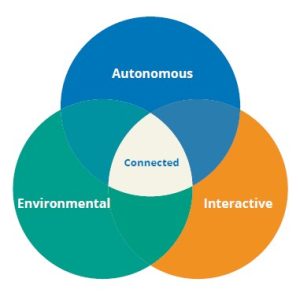
The functions of supervision include:
- Supportive
In this area your manager/team leader is there to support you when work becomes a little difficult; if you are finding certain areas hard, such as time management, dealing with other staff or service users. It is not a counselling session but a way of helping you get ideas on how to manage these situations.
- Educational/development
This area focuses on a skill you may lack that either you or you manager/team leader has noticed. You may be asked to take a course, or maybe they would like to offer you a course. Do not be afraid to ask for educational development. If you see a course that you feel may help you in your job, ask about it. This shows great enthusiasm and willingness to develop new ideas within the organisation.
- Supporting problem-solving
You will sometimes find yourself in a situation where your problem-solving skills need to come into play. We do not as individuals have all the answers all the time; this is where you tackle a problem and get your manager/team leader to advise on how to solve it. It is an opportunity for you to ask whether your idea would work or not.
- Line management: observing development
More often than not, in any type of workplace, line managers will observe your work. This enables the manager/team leader to understand the areas in which you need extra support. It is not a test – it is for your CPD. A good supervisor should be able to observe you and support you to work to the best of your ability (Hughes 2010).
In my workplace you can choose to have informal or formal supervision. The difference is that in informal supervision you can meet with your supervisor at any time, when you feel it is required or when your supervisor feels it is required. Formal supervision involves more work but is very rewarding. It involves three- or six-monthly meetings. My supervisor will email me when the appointment is set. At this point I go back over my last meeting and make sure that any goals that have been asked of me are completed. If I have not reached all my goals I will be honest with my supervisor and explain that maybe I needed a little more support in these areas. My supervisor will then ask what kind of support I need to achieve these goals and these will set as goals for my next supervision, along with new goals. These goals can be as simple as making sure that the cleaning sheets are filled in properly or how to communicate with family members, psychiatrists, physios or GPs.
Good supervision is helpful, not only for professional development but also to give you a sense of job satisfaction and a willingness to perform well. Sometimes you might have ‘bad supervision’. When this happens, you can be left feeling unmotivated. ‘Burnout is also associated with workers’ perception of their relationship with the supervisor, not just whether they received help or support. In Mena and Bailey’s study of child welfare workers in the US, workers’ sense of rapport within the supervisory relationship was related to job satisfaction’ (Carpenter et al. 2012: 9).

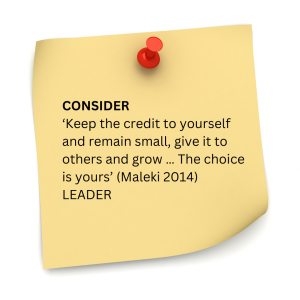
TASK 2 Look at the picture above (Leader and Staff). What do you think it is trying to say?
Supervision needs to be at the right time, in the right environment, with an experienced supportive supervisor and a committed supervisee (Hughes 2002).
- The right time: Supervision needs to take place when you and your supervisor have organised a specific time, so that neither of you is distracted. This will also give you time to think about the areas you want to discuss.
- The right environment: This is very important, it can be difficult to have supervision when your supervisor is sitting across from you behind a desk. Supervision should be professional, but it should also feel relaxed, with no interruptions.
- The right supervisor: Supervision is not a counselling session; it is not a place to display all the things that are being done ‘wrong’. It is a place to learn and grow. A good supervisor should be supportive and point you in the right direction. An experienced supervisor should be able to make you feel that you are supported and they should make you feel motivated to continue with your professional development for the good of both you and the organisation.
- Committed supervisee: This is where your CPD really comes into play. You are the guardian of your own development. Yes, you will have days when it is really tough, and you may feel that you have had enough. This can happen, especially if are considering working in the area of challenging behaviour. You need to use all the resources around you, mainly your supervision. You need to be committed to the process of learning from experience, reflecting on situations and bringing this to your supervision.
Responsibility
When working in the area of adults with intellectual disabilities, challenging behaviour can be very common. It can be stressful and difficult, but that’s okay – many jobs are stressful. That’s where you need to be aware of how you feel and use your colleagues for support. For me, personally, I love my job. You will not find another environment where having a cup of tea and a chat with a service user and other colleagues is a big part of your day. Where life continues in different ways for everyone. When you realise that you are important and that you are making a difference.
When you begin your first employment don’t be afraid to ask questions. Every individual is different and, no matter how much experience you have or may not have, it is important to use all resources available – new and historical files, risk assessments, personal care plans – read it all, and then read it again. Also, staff are a huge resource, but sometimes a culture in an organisation is hard to change, for example you may have a great idea for a programme to work with an individual and you will hear ‘We tried that before’ or ‘Good luck with that.’ The difference is that the individual has never worked with you. No idea is a bad idea. This is where your professional learning comes into play: Did that programme work? Did it not work? What can I do differently to gain a better outcome for the service user? This is how you take responsibility for your professional development and learn to engage with it. Ask questions, use your supervision time to learn how to reflect and improve your professional development. Supervision is an excellent means of insightful learning.
It can be very easy to just go to supervision and sit and nod, ‘tick another box’. Who would that help? It is your responsibility to use the resources that are handed to you. Social care is not born from a vacuum. It takes learning and evolving from all involved. You may have experienced three-way meetings and supervision meetings in college, and these are for your college development – for you to pass or fail – but supervision in the workplace is about you and the organisation. Work experience and three-way meetings will be the closest you will get to professional supervision – so use them. Your college experience and your professional work experience is where your CPD journey starts. Bring this learning into everything that you do, be it college, work experience or life. An idea can be triggered from your experiences that can give a service user as independent a life as possible. How do we engage in CPD? ‘Active engagement in CPD is vital to ensure that health and social care professionals continue to have the up-to-date knowledge and skills necessary’ (SCWRB 2018).
Engagement
Engaging in CPD basically means good listening and understanding; it is a record of your knowledge and of the skills you are learning along the way. It requires reflecting on good and bad situations, participating in your reflection. This does not have to be done at the time of supervision; it is an ongoing, evolving practice. You will get better at it over time – it takes practice. This is why you have to engage in and be the significant cog in the wheel of your CPD. Another way for you to engage is to take part in any training that is provided; research where and how you can upskill. My advice is to start looking now. Websites like www.HSEland.ie have free short courses you can pack into your CV.
I hope you found this chapter useful. I do understand it can be very difficult to visualise what it is like on the floor. Just remember that you are in control of your professionalism and your professional development as a social care worker. There are days when you will question your choice, but let me tell you there are days when you will be so proud of yourself and your work, they will outweigh those ‘questioning days’. Positivity begets positivity. Remember, life is short, so make sure that you laugh at least once a day while on the job!
![]() Tips for Practice Educators
Tips for Practice Educators
- Focus on Reflective writing. Writing a paper academically is important, but students should try focus what the outcomes of learning are in relation to which field they hope to get into.
- Try role playing different scenarios:
- Look at scenarios of challenging behaviour, how a service user may become agitated over a loud noise and lash out and hit other service users or staff members. What should the student do?
- Look at a scenario where a service user may disclose information of abuse; this can be used for sexual, financial, emotional or physical abuse. (Bring in safeguarding here.)
- Keep it simple. For example: Service user A, non-verbal, would like to know how to make a cup of tea. This person is autistic, can understand but cannot verbally communicate. Ask the students to make a PECS (picture exchange communication system). Also have them work on ‘now and then’ cards.
- All this information can be easily sourced from websites such as lessonpix or AsIam.ie.
- Explain and explore the different areas of social care, what can you (the student) do once you leave?
- What we as social care workers do out of college is very difficult for a student to visualise.
- Make learning collaborative and hands-on.
- Organise trips to different day centres, residential centres, homeless centres, etc. (Many organisations would be happy to give tours and explain what they do.)
- Use a lot of situational case studies.
- Collaborate with social care workers in the community, ask them to come in and explain what they do.
References
Carpenter, J., Webb, C., Bostock, L. and Coomber, C. (2012) ‘Effective supervision in social work and social care’, Research Briefing 43. SCIE.
Gibbs, G. (1988) Learning by Doing: A Guide to Teaching and Learning Methods.
Hughes, J.M. (2010) ‘The role of supervision in social work: A critical analysis’, Critical Social Thinking: Policy and Analysis Vol. 2.
Maleki, S. (2014) ‘Good supervisors vs bad supervisors’, Series #3: ‘Giving credit to trainees’. Available at <samanmaleki.blogspot.com>.
Mena, K.C. and Bailey, J.D. (2007) ‘The effects of the supervisory working alliance on worker outcomes’, Journal of Social Service Research 34(1): 55−65, cited in Carpenter, J., Webb, C., Bostock, L. and Coomber, C. (2012) ‘Effective supervision in social work and social care’, Research Briefing 43. SCIE.
SCI (Social Care Ireland) (2019) What is Continuing Professional Development (CPD)? Available at <https://socialcareireland.ie/continuing+professional+development-cpd/>.
Social Care Workers Registration Board (2019) Social Care Workers Registration Board code of professional conduct and ethics. Dublin: CORU Health and Social Care Regulator. Available at https://coru.ie/files-codes-of-conduct/scwrb-code-of-professional-conduct-and-ethics-for- social-care-workers.pdf.

